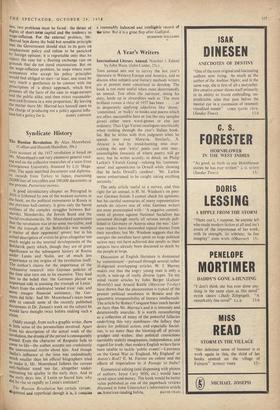Syndicate History
The Russian Revolution. By Alan Moorehead. . (Collins and Hamish Hamilton, 30s.)
Tins
account of the 1917 revolution is based on Mr. Moorehead's not very extensive general read- ing and on the collective researches of a team from Georgetown University, financed by Life Maga- zine. The team searched documents and diploma- tic records from Turkey to Japan, examining 20,000 feet of microfilm and 100,000 documents in the process. Parturiunt monies.
A good introductory chapter on Petrograd in 1916 is followed by one of the weakest sections in the book, on the political movements in Russia in the previous half-century. It gives only the barest outlines of the complex struggles between Bol- sheviks, Mensheviks, the Jewish Bund and the Social revolutionaries. Mr. Moorehead appreciates that the revolution was irr no sense inevitable, and that the triumph of the Bolsheviks was mainly • a matter of their opponents' errors; but in his actual description of events he gives altogether too much weight to the internal developments of the Bolshevik party which, though they are of great significance to the subsequent history of Russia under Lenin and Stalin, are of much less importance to the.origins of the revolution itself. The author's claims for the importance of the 'exhaustive research' into German policies of the time also turn out to be excessive. They lead him to the belief that the Germans played an important role in assisting the triumph of Lenin.' Apart from the celebrated 'sealed train' ride, and Some . meagre financial assistance, the Ger- mans did little : had Mr. Moorehead's team been able to consult some of the recently published documents in Dr. Zeman's work on the subject he Would have thought twice before making such a
Claim
Oddly enough, from such a graphic writer, there is little sense of the personalities involved. Apart from his description of the actual week of the revolution, the drama of the period is consequently missed. Even the character of Rasputin fails to come to life—the author accepts too credulously the conventional myths about him. And though Stalin's influence at the time was undoubtedly illuch smaller than his official biographers tried to make it, Mr. Moorehead follows the current anti-Stalinist trend too far, altogether under- estimating his quality in the early days. And in the early days, too, if Lenin so feared him, why dId he rise so rapidly as Lenin's assistant?
The Russian Revolution has certain virtues : disjointed and superficial though it is, it contains a reasonably balanced and intelligible record of the time. But it is a great flop after Gallipoli.
DESMOND WILLIAMS


































 Previous page
Previous page